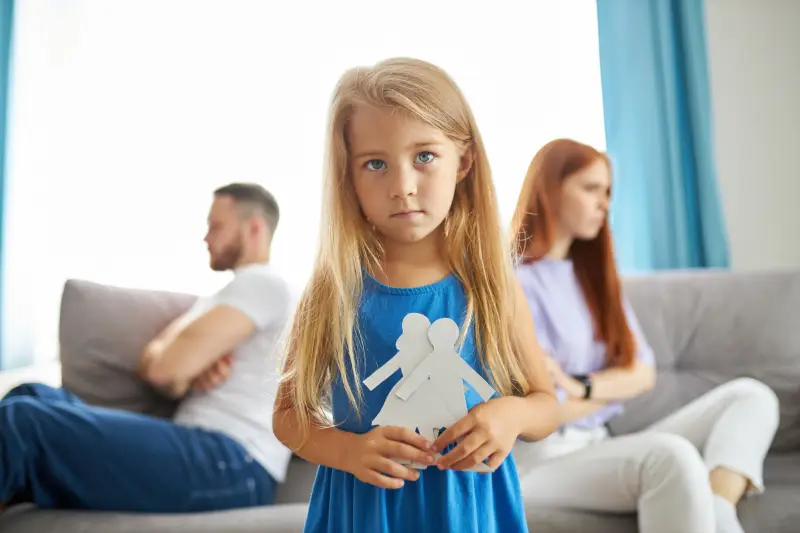
Co-Parenting Made Simple: Tips for Raising Kids Together After Divorce
Co-parenting after a divorce can feel daunting for kids as well as parents, but it’s one of the most important commitments parents can make for the well-being of their children. Instead of allowing conflict and tension to dictate the relationship, effective co-parenting offers a chance to provide children with stability, love, and support from both parents. It’s about creating a positive, cooperative environment that prioritizes the child’s needs over past disagreements. This journey, though challenging, can lead to stronger family bonds, healthier communication, and happier children. Let’s explore practical tips to make co-parenting smoother, more effective, and ultimately beneficial for everyone involved.
Impact of Divorce on Children

Divorce can have a significant impact on children, and the effects can vary depending on their age, personality, and how the divorce is handled by both parents. Here are some common ways divorce can affect children:
1. Emotional and Psychological Impact
- Feelings of Loss: Children often experience a sense of loss, not just because of the family unit being split, but because of changes in routines, living arrangements, and daily interactions with both parents.
- Guilt and Self-Blame: Children, especially younger ones, may internalize the situation and feel that they are somehow to blame for the divorce. They might question whether they could have done something to prevent the split.
- Anxiety and Depression: The emotional toll of divorce can lead to anxiety, sadness, or even depression. Children might have trouble adjusting to the new family dynamics and may experience feelings of uncertainty about the future.
2. Behavioral Changes
- Acting Out or Withdrawal: Children may display disruptive behavior, including aggression, tantrums, or defiance. Conversely, some children may withdraw, becoming more introverted or distancing themselves from family and friends.
- Difficulty with School Performance: The stress of divorce can affect a child’s focus and academic performance. They might have trouble concentrating, leading to declining grades or difficulty with schoolwork.
3. Changes in Relationships
- Relationship with Parents: Divorce can alter the parent-child relationship. Children may become closer to one parent or may feel torn between the two. They may also struggle with navigating loyalty, especially if one parent is critical of the other.
- Trust Issues: The dissolution of the family unit might make children skeptical of future relationships. They could develop trust issues, fearing that future relationships will also end in disappointment.
4. Adjustment to New Routines
- Living Arrangements: Moving between two homes can be a logistical challenge for children, and some may feel unsettled with the lack of stability. Adapting to different rules, routines, and environments in each home can be confusing.
- Holiday and Special Occasions: Holidays, birthdays, and family celebrations can become more complicated after a divorce. Children may feel torn between parents or have a harder time enjoying these moments without both parents present.
5. Impact on Future Relationships
- Modeling Future Relationships: Children who experience divorce may carry certain beliefs and behaviors into their adult relationships. Some may fear commitment or struggle with forming healthy relationships due to the way they witnessed their parents’ relationship deteriorating.
Parenting Tips for a Healthy Relation

1. Communicate Effectively and Respectfully
Effective communication is one of the most critical components of successful co-parenting. Both parents need to be on the same page and able to discuss their children’s needs without the presence of animosity or conflict.
Keep the Lines of Communication Open
Maintaining regular, honest communication with your co-parent is essential. Whether through phone calls, emails, or a shared co-parenting app, staying in contact ensures that both parents are informed about the child’s activities, health, and needs. Regular communication allows for any concerns to be addressed before they become larger issues.
Avoid Using Kids as Messengers
It can be tempting to send messages or make requests through your children, but this can create unnecessary stress for them. Children shouldn’t feel like they have to mediate between their parents. Instead, both parents should make an effort to communicate directly with each other, keeping the children out of adult conversations as much as possible.
Use Neutral Tones and Avoid Arguments in Front of the Kids
Disagreements will inevitably happen, but it’s important to keep them civil and respectful. Avoid raising your voice or arguing in front of the children, as they may feel uncomfortable or anxious. If a disagreement arises, it’s best to handle it privately, ensuring that the children feel safe and loved in both homes.
2. Set Clear and Consistent Rules
Children thrive in environments where there are clear expectations and consistency. When parents create similar rules in both homes, children experience less confusion and are more likely to feel secure.
Establish Consistent Rules and Expectations
Creating consistent household rules between both parents’ homes can provide children with a sense of stability. This might include rules about screen time, bedtime, chores, and curfew. While it’s natural for parenting styles to differ, having some level of uniformity between households helps avoid confusion and gives children the consistency they need.
Respect Each Other’s Parenting Styles
While it’s important to maintain consistent rules, it’s also crucial to respect the fact that each parent may have different approaches. Whether it’s discipline, routines, or decision-making, different styles can work as long as they’re consistent and clear. Allow each parent the flexibility to raise the child in their unique way, as long as it is in the child’s best interest.
3. Put the Kids’ Needs First
When co-parenting after divorce, it’s important for both parents to focus on the emotional and psychological needs of their children. Although this can be difficult at times, prioritizing your children’s well-being will lead to healthier outcomes for everyone involved.
Prioritize Their Emotional and Mental Well-Being
Divorce can be a traumatic experience for children, and their emotional health should always come first. Make sure they feel loved and supported by both parents. Allow them to express their feelings and validate their emotions. This can help ease any confusion, anxiety, or sadness they may feel due to the changes in their family dynamic.
Be Flexible to Meet the Kids’ Needs
Life is unpredictable, and sometimes you may need to adjust plans to accommodate your children’s needs. Whether it’s for a special event, a school project, or a medical appointment, being flexible with scheduling shows your child that their needs are important to you. Flexibility also helps reduce tension between co-parents, as it demonstrates cooperation and support.
4. Foster Positive Relationships with Both Parents
A healthy co-parenting relationship not only benefits the parents but also supports the child’s relationship with both parents. The more harmonious the co-parenting dynamic, the more secure the child will feel.
Encourage a Relationship with Both Parents
Children need to feel that they have strong, positive relationships with both parents. Encourage and support their time with each parent, and refrain from speaking negatively about the other parent. A child’s relationship with both parents is crucial for their emotional development, and it’s essential to ensure that each parent has the opportunity to build a meaningful connection with their child.
Work Together as a Team
Even though you’re no longer together, co-parents should approach parenting as a team. It’s important to present a united front when making decisions regarding the child’s education, health, and well-being. Working together to make decisions will provide children with a sense of security and stability, and help them feel supported by both parents.
5. Seek Outside Help When Needed
Sometimes, co-parenting can be challenging, and it’s okay to seek professional help if necessary. Whether it’s a counselor, mediator, or co-parenting coach, outside professionals can offer valuable strategies for improving communication, resolving conflicts, and navigating tricky co-parenting situations.
Mediation for Disagreements
If there are ongoing conflicts or disagreements between parents, mediation can be a helpful tool. A neutral third party can facilitate discussions and assist in finding solutions that are in the best interest of the children. Mediation is often less confrontational than going to court and can lead to more collaborative solutions.
Family Counseling
Family counseling can also be beneficial, not just for parents but for children as well. A therapist can help children navigate the emotional challenges of divorce, offering them a safe space to express their feelings. It can also help parents understand how to better support their children during this difficult time.
6. Create a Parenting Plan
Having a clear, written parenting plan can help avoid confusion and disputes. This document outlines the responsibilities of both parents, visitation schedules, holiday arrangements, and how decisions regarding the child’s upbringing will be made.
Develop a Parenting Plan Together
Creating a parenting plan is a collaborative process. Both parents should be involved in the creation of the plan, ensuring it addresses the child’s needs, both emotionally and practically. The plan can be revisited and adjusted over time as the child grows and their needs evolve.
Incorporate Flexibility
While having a structured plan is essential, it’s also important to allow for flexibility. Life events, work schedules, and unexpected changes may require adjustments. By building flexibility into your plan, you ensure that both parents can accommodate each other’s needs and remain responsive to the child’s changing life circumstances.
7. Maintain Respect for Each Other’s Time with the Children
One of the keys to co-parenting is respecting each other’s time with the children. This helps ensure both parents feel involved and that the child has quality time with each parent.
Respect Scheduled Time
If one parent has custody or visitation during a particular period, the other parent should respect that time without interruption. This includes not making last-minute demands or scheduling events during the other parent’s time. Keeping the boundaries clear allows both parents to focus on their relationship with the child.
Be Mindful of Parental Boundaries
Both parents should have the space to parent without unnecessary interference. This means allowing the other parent to set rules, routines, and engage with the child without judgment or control. Support each other’s efforts and celebrate each other’s time with the child.
8. Don’t Use Children as Emotional Support
Children are not emotional caretakers, and they should never be put in the position of having to take sides or provide emotional support for either parent. It’s crucial to keep your emotional needs separate from your co-parenting duties.
Seek Adult Support
If you’re struggling emotionally, seek support from friends, family, or a therapist. Relying on children for emotional comfort places a burden on them and may harm their development. Keep adult issues and emotional needs outside of the co-parenting dynamic.
Create Healthy Boundaries
Establish emotional boundaries by not sharing adult struggles, conflicts, or frustrations with your children. This allows them to focus on their own emotional well-being without being weighed down by adult problems.
9. Support Each Other in Parenting Decisions
Even though you are no longer together, parenting decisions should still be a joint effort. Working together and supporting each other’s decisions helps create a balanced and unified approach to raising the child.
Involve Both Parents in Major Decisions
Decisions such as schooling, medical care, and extracurricular activities should involve both parents. Even if one parent has primary custody, the other should be informed and consulted when it comes to significant choices that impact the child’s future.
Respect Each Other’s Perspectives
Sometimes, parents will disagree on how to raise a child, and that’s okay. What’s important is to approach each situation with respect for each other’s perspectives and to find a middle ground. Disagreements should be handled maturely, focusing on what’s best for the child.
10. Practice Patience and Give Yourself Grace
Co-parenting is a long-term commitment, and it’s essential to be patient with both your co-parent and yourself. Parenting, especially in a post-divorce scenario, is full of challenges, and mistakes will happen.
Be Patient With the Process
Adjusting to a new dynamic after a divorce takes time. You and your co-parent will need to adapt to new schedules, living arrangements, and routines. Be patient and give yourselves time to settle into the new normal.
Practice Self-Compassion
Co-parenting can be exhausting, emotionally and physically. It’s important to take care of yourself and acknowledge that no one is perfect. If mistakes are made, don’t be too hard on yourself. Learn from them, communicate openly, and continue moving forward with a focus on creating a stable and loving environment for your child.
Conclusion
Co-parenting after divorce is undoubtedly challenging, but it’s also an opportunity to create a healthy, supportive environment for your children. By communicating effectively, setting clear rules, prioritizing the kids’ needs, fostering positive relationships, and seeking help when needed, both parents can ensure that the child’s best interests are always at the forefront. Remember that the goal is not only to navigate the post-divorce period but to help your children grow in a stable and loving environment, with the support of both parents.





